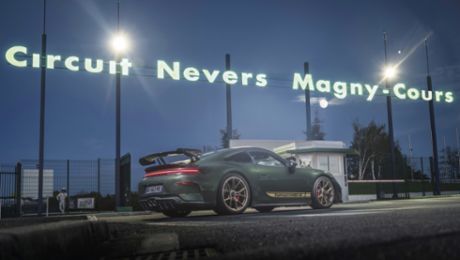Functional, ergonomic and reduced to the essentials, the Porsche 718 Spyder RS is a driving machine for the purist – even on the inside. In true RS fashion, full bucket seats are fitted as standard. These were first installed in the 918 Spyder super sports car. They are made of carbon fibre-reinforced plastic (CFRP) with a carbon-weave finish and offer optimum lateral support with minimal weight. The thorax airbag is integrated, height adjustment is electric and longitudinal adjustment is manual.
Grippy sports steering wheel with a top centre marking
The sports steering wheel is especially wieldy, with a diameter of just 360 millimetres, and is trimmed in black Race-Tex with a yellow top centre marking — so the driver always knows in which direction and how far the front wheels are turned. The marking can provide valuable additional information when control is what is needed, particularly during performance-oriented driving and in situations with correspondingly fast steering movements.
The standard steering wheel can be adjusted for reach and rake. Anyone who needs maximum flexibility from their seats can alternatively select the optional Adaptive Sports Seats Plus with 18-way power adjustment. All functions for both the driver and passenger seats can be adjusted electrically: backrest angle, seat height, fore and aft position, tilt angle and depth of the seat surface. There is also an electrically adjustable lumbar support in both seats, and even the side bolsters on the seat cushion and backrest can be individually adjusted at the touch of a button. The seats are upholstered in black leather, with seat centres made of black Race-Tex. A black Spyder RS logo is embroidered into the headrests.
Classic GT gear lever
As in the Porsche 911 GT3 and 718 Cayman GT4 RS before it, the PDK gear selector in the centre console resembles a manual gear lever. It can be used in manual guise to sequentially shift between gears in the seven-speed dual-clutch gearbox. Pulling back triggers upshifts, while pushing forward triggers downshifts; a common setup with motorsport gearboxes. At the same time, drivers have shift paddles on the steering wheel at their disposal, with colour-coded +/- symbols to indicate the shift direction: right to upshift, left to downshift.
Those who choose the optional Weissach Package get significantly more Race-Tex features in the interior. The visual highlight is the upper side of the dashboard, which is completely covered in anti-glare Race-Tex. The Weissach Package logo also features on the cupholder trim and is embroidered into the headrests.
Connectivity, navigation and silent alarm
Among the standard equipment on the 718 Spyder RS is Porsche Communication Management (PCM) and a navigation system that includes Porsche Connect. Car Connect Services with Remote Services, Safety Services, Security Services and Apple CarPlay® are also fitted as standard. The navigation system is capable of dynamic route calculation, can be operated by voice command and receives automatic map updates. The integrated LTE module helps with operation of the standard online functions. The vehicle can be ordered without the infotainment system, which reduces the vehicle weight by a further six kilograms.
Other optional equipment is available, such as a smartphone compartment and Porsche Vehicle Tracking System Plus (PVTS Plus). The latter system uses a driver card to monitor whether the authorised driver is at the wheel. If the 718 Spyder RS is on the road without a Driver Card, PVTS Plus automatically triggers a silent alert to the alarm centre commissioned by Porsche, as well as sending a notification to the rightful owner’s Porsche Connect App.
Exclusive Chronograph only for buyers of the Spyder RS
There is a matching chronograph for the 718 Spyder RS that bears the name of the new mid-engined sports car and which is exclusively offered to buyers of the Spyder RS and the Spyder RS with the Weissach Package. With its titanium case, the exclusive timepiece has the characteristic lightness of its namesake. The chronograph also takes after its automotive cousin in its high level of configurability: the customer can choose between natural titanium and black titanium for the case’s appearance, while there’s a matching bezel that features either a minute or tachymeter scale as desired. The band is available either in a smooth black vehicle leather with a Race-Tex accent or in titanium, and the dial is available in carbon or black. The hands are available in white, black or yellow. On the back, the Chronograph 718 Spyder RS features a rotor whose design echoes that of the wheels installed on the respective car. The rotors themselves can be ordered in six different colours, while the individual colour ring around the dial can be in any of the colours available for the Porsche 718 Spyder RS – whether standard, metallic or special colours. As if that weren’t enough: the 114 colours of the Porsche Paint to Sample programme, which features a number of classic hues, are also available for the watch. This alone means it’s entirely possible that you can create a truly one-off timepiece. And the buyer can remove all doubt by having up to 12 characters engraved into the back of the watch, such as the VIN number of their own roadster.
The Chronograph 718 Spyder RS is an exquisite piece if craftsmanship and is made to exacting standards of precision in Porsche’s in-house watchmaking operation in Solothurn, Switzerland. The 01.200 movement with COSC certification is the beating heart of the timepiece. One special technical feature is the flyback function: with just one button, the triggered stopwatch can be stopped, reset and restarted. Exclusively for customers of the new Porsche 718 Spyder RS, the Chronograph 718 Spyder RS can be ordered in Porsche Centres and online at porsche-design.com for a price of € 9,500.

